Decoding ethics and trust at the workplace in a digital age
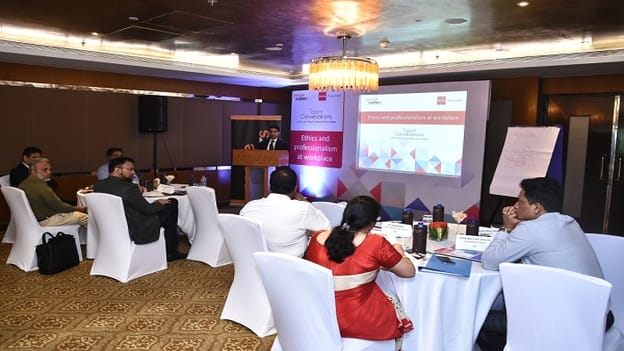
What is the importance of ethics in a digital age? As businesses become more digital and technology becomes all pervasive, are the fine lines between monitoring and surveillance diminishing? Does technology increase emphasis on transparency or is leading to the creation of more gray areas as far as ethics is concerned? And how can organizations build a culture to deal with ethical challenges that may arise because of the all-pervasiveness of digital?
These are some of the questions which an which an august gathering of senior HR leaders aimed to answer at the Round Table organized by People Matters in Mumbai in association with the Association of Chartered Certified Accountants (ACCA).
Kush Ahuja, Head of Business Relations, ACCA also revealed interesting insights from an in-depth global survey titled ‘Ethics and trust in a digital age’ ACCA conducted in Q1 2017 to obtain the views of professional accountants, or those training to become such, on ethics and trust in a digital age. The survey was completed by over 10,000 respondents in 158 countries, of whom roughly 40% were ACCA members. In addition, to get a view of how accountants are perceived by others, 510 C-suite respondents who interact with the accountants in their organizations were also surveyed.
The survey looked at three main aspects-a digital future and how ethics plays out within that, what does an ethical dilemma actually looks like when faced in a digital age and how ethical judgement might increasingly need to be applied in the future, and the global perspective on ethics and trust.
The importance of ethics in a digital age
The survey revealed that over 60.1% professional accountants and 44.3% of C-suite executives strongly agreed that strong ethical behavior and principles will become more important in the evolving digital age. In all, almost 9 in 10 professional accountants and 85% of C-suite executives who deal with PAs agree that ethics will become more important in a digital future.
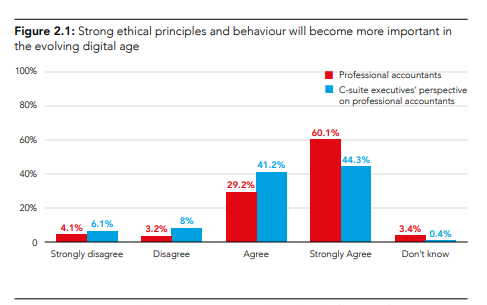
So while the fast pace of technology change creates new and possibly ambiguous scenarios and technology will have an impact on the details one needs to understand to be ethical, but in no way it reduces the importance of being ethical. In fact, it increases it.
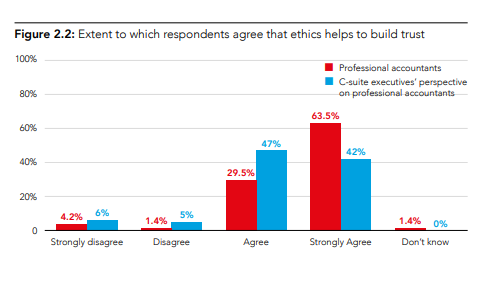
Again, a vast majority of respondents (94%) supported the view that ethical behavior does help to build trust in the digital age.
In addition, C-suite executives were asked a more specific question about the link between the ethics of the accountant and the ability of the organization to build trust with internal and external stakeholders. Almost all C-suite respondents agreed that the accountant’s ethical behavior helps the organization to build trust, with 2 in 5 being of the view that it helps to a very significant degree.
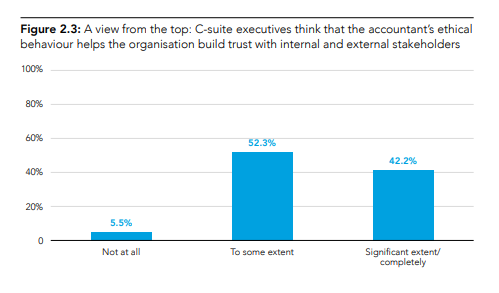 The survey also revealed that in the recent past, i.e. last 12 months, a significant number of respondents of about 1 in 5 were exposed (directly or observed) to an ethical challenge in the last 12 months. Where the respondent directly experienced an ethical challenge, the survey found that there is again a significant number of respondents who did not report the incident – about 2 in 5.
The survey also revealed that in the recent past, i.e. last 12 months, a significant number of respondents of about 1 in 5 were exposed (directly or observed) to an ethical challenge in the last 12 months. Where the respondent directly experienced an ethical challenge, the survey found that there is again a significant number of respondents who did not report the incident – about 2 in 5.
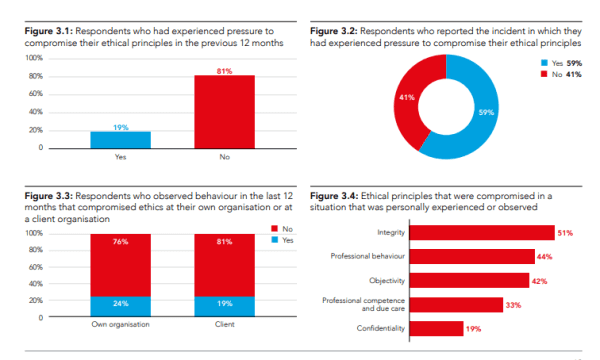
Respondents cited that Integrity was cited as the most frequently compromised fundamental principle in these breeches.
Which brings us to the most important question as to where is there a perceived need for support to promote ethics?
The survey revealed that a Strong leadership to set the tone at the top was cited as the top area where support is needed for promoting ethical behavior in organizations.
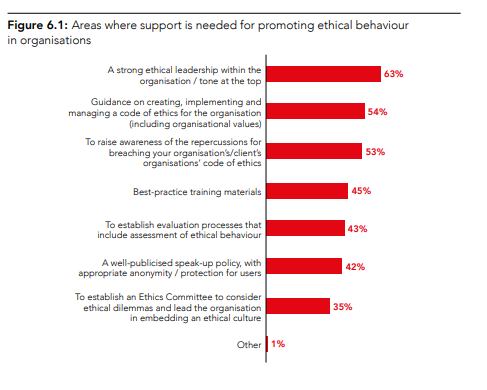 The second most commonly cited need, chosen by just over half the respondents, was for support in creating, implementing and managing a code of ethics for the organization. Fewer than half the respondents said they would value the support of a well-publicized ‘speak-up’ policy, with appropriate anonymity or protection features.
The second most commonly cited need, chosen by just over half the respondents, was for support in creating, implementing and managing a code of ethics for the organization. Fewer than half the respondents said they would value the support of a well-publicized ‘speak-up’ policy, with appropriate anonymity or protection features.
Impact of digital on organizational culture and ethics
Many times, culture is seen as a key reason for the failure of ethics in the workplace. So how can organizations assess their culture and values and to what extent are they embedded in the behavior of the employees?
While the gathering agreed it is not easy to assess culture, but most agreed that if an organization is practicing something and it is driven from the top, the message passes on to the employees and the customers. This again reiterates the finding from the survey that a strong leadership sets the tone of ethical behavior in an organization.
What also helps in setting this tone is evaluating what parameters you have to reward and reprimand the kind of values displayed by employees. What does your performance management speak about? What does your talent development speak about? How are you hiring and from where are you hiring and what are the key aspects you are looking at that point in time?
For instance, giving a certain weight to value congruence in appraisals is one way for an organization to set the tone of what it wants to see as its culture. In addition, some kind of an assessment of near misses or incidents where values were compromised is another way to assess how the values are being permeated across the organization.
While there is no denying the fact that there is a huge amount of gray in the day to day life and terms like values, honesty, integrity are relative are contextual, stemming from judgments and decisions, overall with digital becoming all-pervasive, more organizations are veering towards becoming ethical.
On one hand, digital helps organizations with imprints, increases surveillance, and mitigates risk, but on the other hand, too much emphasis on digital can also lead to questions on privacy and could lead to a borderline trust deficit.
In conclusion, the gathering agreed digitization has generally increased transparency and employee accountability. So overall it is good for the individual and the health of the organization. While ethics will always be a nebulous concept, a product of interpretation and organizations will need to keep on educating people about ethics, digital has not taken away anything from the emphasis on ethics and professionalism. If anything, it has increased the spotlight on the need for ethics and professionalism.
[The article is curated from the Round Table organized by People Matters in Mumbai in association with ACCA and the ACCA report on Ethics and trust in a digital age.]









